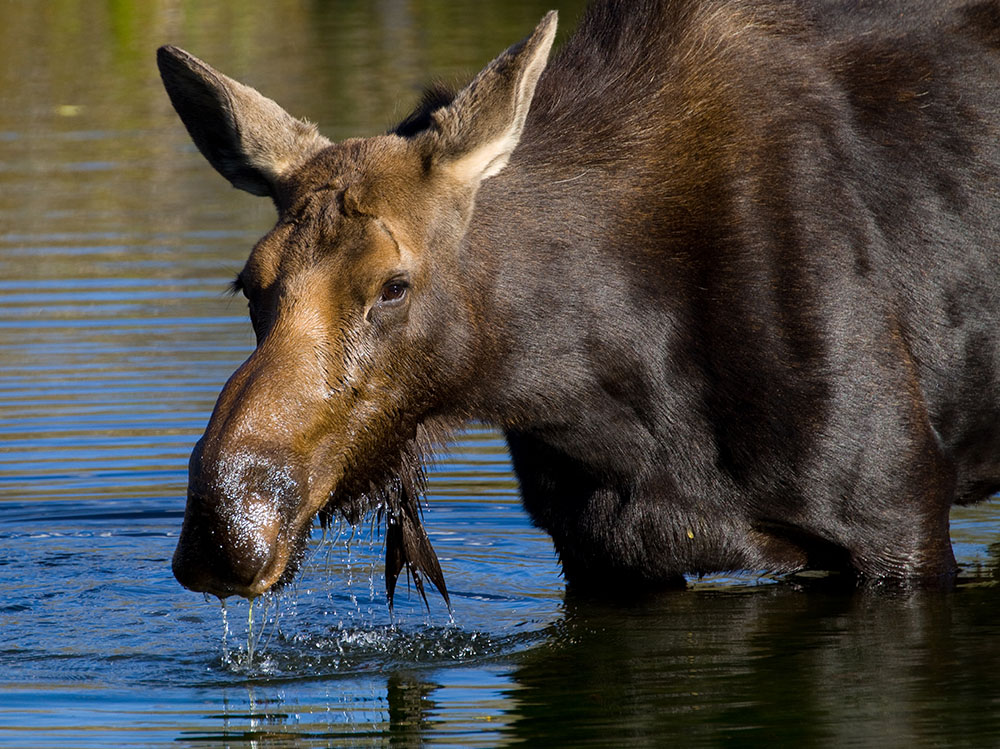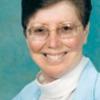
A female moose grazes for water plants in Grand Teton National Park in Wyoming. (Wikimedia Commons/Tony Hisgett)
"I don't understand poetry. That's why I don't read it."
As a religious sister who is also a poet, I hear this from many people. And to be honest, sometimes I don't understand poetry either. Sometimes I don't even understand my own poetry. That is, until a year later I happen to find a poem in my slush pile, and I say to myself, "Wow, I wrote that?"
There is another side to the coin. Several years ago, I received a rejection letter for my poem "Muse." The editor seemed adamant when he wrote in his response that he didn't publish religious or spiritual poetry. I was taken aback, as I thought I had expressed a different idea when I wrote it. When I reread the poem, I thought, perhaps he was right.
So, believe it or not, you don't have to understand poetry to like it. Recently, I had an insight about that "understanding." I am a huge fan of Renée Fleming, the famous opera soprano. Just for the sake of discussion, let's say that while I enjoy her singing, I decide to skip the foreign language songs because I don't understand them.
One person could respond that I could find a translation of what she is singing. Another could suggest that I research the history of the music and the language so I could get more out of her performance. Finally, a third might ask, "Why don't you just enjoy her singing and not worry about the lyrics?"
And that is what I do. Occasionally, when I am curious, I check out a translation of the song or a summary of the role she is playing. So, poetry, like music, can be enjoyed just for itself.
Theology can say only so much, as it is rational — and reason has its limits. We also need the intuition of poets to express what reason cannot.
Let's take another look at the statement "I don't understand poetry." Perhaps if I rephrased the words a bit one could also say, "Because I don't understand God, that's why I don't or can't believe in him." Many traumatized people and those who are sensitive to evil in the world often come to that decision.
In contrast, because I am a person of faith, I seek to understand who God is for me. That is where theology enters the picture. Theology is the human attempt to express what we know and understand about God. And this seeking is ongoing because we continue to grow in our knowledge and awareness. The fun part is that this seeking will continue until heaven.
St. Anselm of Canterbury (1039-1109) was an English Benedictine monk known for his learning. He is well known for his maxim, "For I do not seek to understand in order to believe, but I believe in order to understand."
However, theology can say only so much, as it is rational — and reason has its limits. We also need the intuition of poets to express what reason cannot. Yet, poetry and theology mirror each other, and that mirror is precision, which can be summed up in Samuel Taylor Coleridge's idea of poetry: "The best words in their best order."
Many famous poets wrote religious/spiritual poetry as well as what could be called "secular" poems: One example is Denise Levertov. I suggested her poem "Annunciation" for a man I directed on his annual retreat. Another example is Joy Harjo, who in 2019-22 was the first Indigenous person (Muscogee Creek Nation) to be appointed as the United States' poet laureate. She reveals a First Peoples spirituality in her poetry through her deep connection to all creation.
Poetry and spirituality both ponder the transcendent Holy; they also celebrate the humble and the ordinary.
Some poets were either spiritual by nature or religious by vocation. For example, John Milton, William Blake and Mary Oliver were spiritual by nature. Others, spiritual by vocation, include Gerard Manley Hopkins, Jessica Powers and Thomas Merton. These names and their poetry are part of the literary culture.
However, for those who believe poetry is an alien language, the statement still stands: "I don't understand poetry. That's why I don't read it."
Spirituality should also be included in this discussion. One of the most famous spiritual masters was St. John of the Cross, who was first a mystic and poet, and second a theologian. Trained in theology, he used it to expand on his poetry.
Poetry and spirituality both ponder the transcendent Holy; they also celebrate the humble and the ordinary. Both challenge the reader and the believer to see God in all things; or, as Blake wrote in his "Auguries of Innocence," to "hold infinity in the palm of your hand." Many readers as well as literary critics consider Blake a great English mystic.
As I mentioned earlier, there are poems I don't understand. One poet I admire is Elizabeth Bishop. While her poems seem straightforward on first or even 20th reading, they are far more than meets the eye. I have struggled with unpiecing her puzzles, to understand what she is trying to tell me and what each poem is trying to say.
Perhaps her best expression of her spirituality and the transcendent is her poem "The Moose."
Advertisement
Here, Elizabeth is the unseen narrator of a group of people's ordinary encounter with one of God's creatures — a moose. However, during this momentary encounter, the bus passengers experience more than the mundane; they encounter the mysterious presence of the Holy.
It is interesting to note no one on the bus realizes this presence as sacred. Yet, they have experienced what I would call, the "Oh, my" moment, one that is breathtakingly beautiful because it is sacred.
Another poet I admire is Maya Angelou. Her poetry sings a spirituality of elegance and resurrection, of life out of death. Her famous poem "Still I Rise" distills her choice to live beyond being a survivor into words that breathe out the true meaning of power.
Remember the line from a song: "When I grow up, I'm gonna be like you"? Well, when I grow up, I want to be like Maya Angelou. As an aside — once I saw a YouTube clip of her reading one of her poems. I almost fell on the floor when I saw a tear roll down her cheek when she finished. I still find it difficult to remember the moment I saw one of my heroes cry.
In conclusion, may a poem bless you and deepen your prayerful encounter with the mystery that is God.
For spiritual reading during Advent, or any time throughout the liturgical year, consider using lectio divina as you meditate on:
- Song of Songs from the Old Testament.
- St. John of the Cross: "If You Want" — a poem about the Virgin Mary.
- Gerard Manley Hopkins: "The Blessed Virgin Compared to the Air We Breathe."
- Denise Levertov: "Annunciation."
- Madeleine L'Engle: "The Birth of Wonder." She was a devout Episcopalian.
- Mary Oliver: Hers was an undeclared religion. Yet she could say, "I know that a life is much richer with a spiritual part to it. And I also think nothing is more interesting. So I cling to it." One of her books is titled Devotions: The Selected Poems of Mary Oliver.







